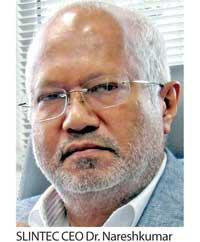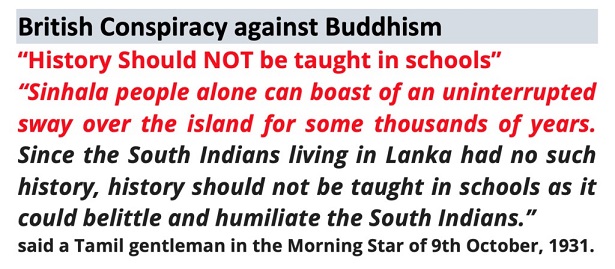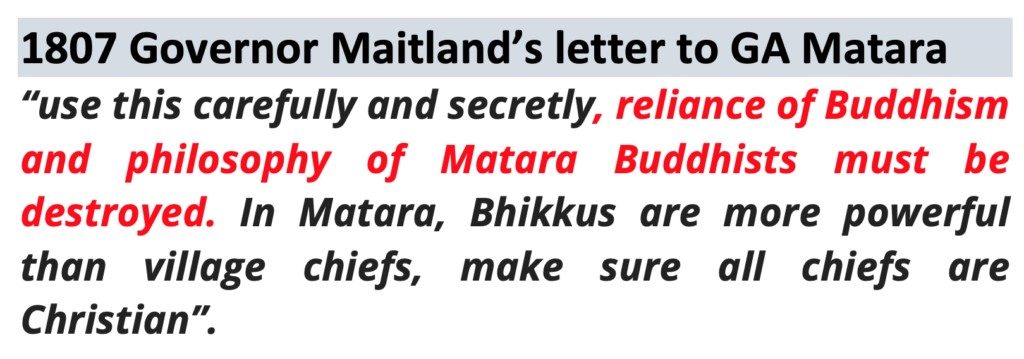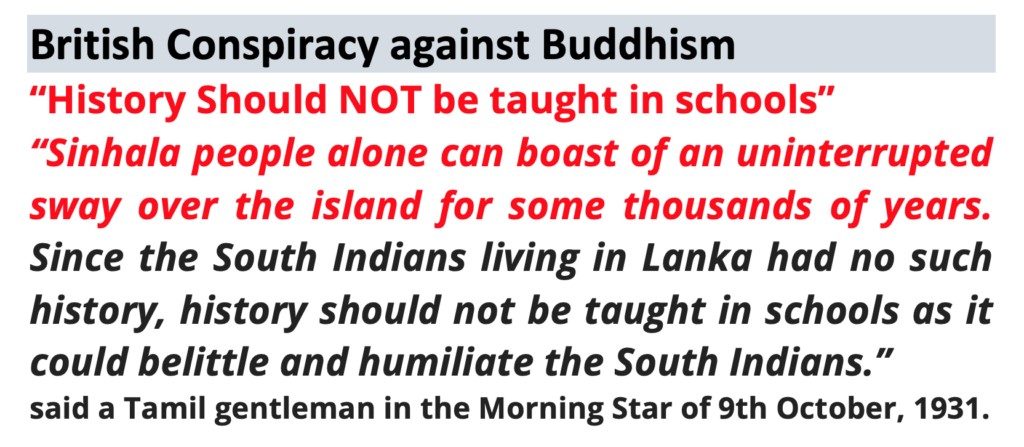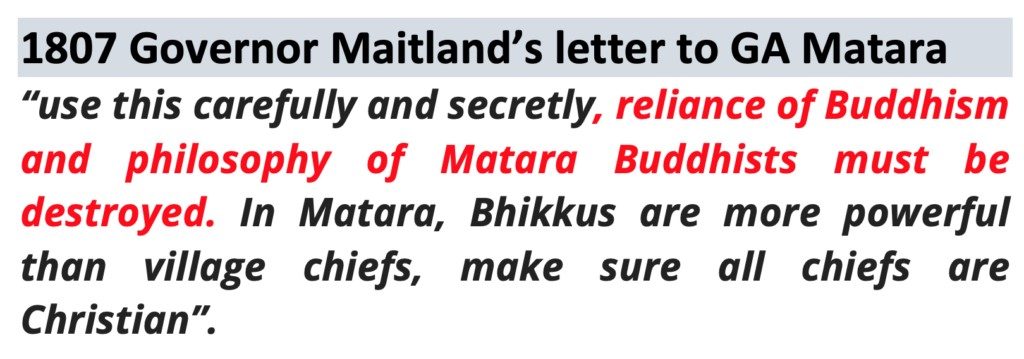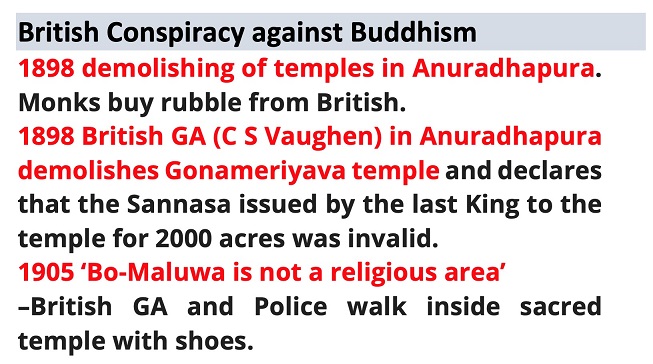Ref. Taskforce headed by Gnanasara Thera; Pre-determined objectives
November 5th, 2021Dr Sudath Gunasekara
Following comments are made on the article that appeared under the above heading in the media in the name of the 6.9million who voted the President in August 2019
Task force headed by Gnanasara Thera; Pre-determined objectives
(Yes. of cause, it was a set of unresolved burning objectives that remained unresolved for71 years since1948. These were issues that had to be settled in 1948 as we got the so-called Independence, Unfortunately, none of that sort took place. Instead, they only transferred the administration to their lackeys to be carried out, on their behalf within the British Commonwealth of Nations tightly tied under the Soulbury Constitution made by them to meet their colonial objectives. These issues had been simmering under the embers of nationalism until 2019 where people made a firm resolution to elect a national leader to get this long-awaited job done).
The appointment of Venerable Gnanasara thero to head a Presidential Task Force (PTF ) raises several issues related to both governance and national reconciliation
(Not at all. It has only fired the first salvo towards proper governance and national reconciliation Therefore no one should get perturbed, over the appointment of this PTF as it will lay the foundation for political stability and good governance for years to come).
(The only way for national reconciliation is to go back to the situation in 1815. Before 1815 we had only one nation. That was the Sinhala nation. Tamils and Muslims were there even then. But they all were part of the Sinhala nation. It was the Suddas who raised the T & M to the status of nations in order to destroy the Sinhala nation.)
An examination of the mandate of the newly appointed PTF reveals that it is required and empowered to
(1) Make a study of the implementation of the concept ‘One Country, One Law’ within Sri Lanka and prepare a draft act for the said purpose and
(2) To study the draft acts and amendments already prepared by the Justice Ministry in relation to this subject and to submit suitable amendments where appropriate.
(This Mandate is given meant to fulfil this target. And nothing short of it)
While the ‘One Country, One Law’ concept was widely used in the 2019 Presidential election and the 2020 Parliamentary elections by the Sri Lanka Podujana Peramuna (SLPP) as a slogan to mobilise the Sinhala Buddhist votes, what it meant was never clearly articulated during the campaign nor has it been explained in the terms of reference of the new Presidential Task Force .
(Above is the explanation)
People are therefore left to figure out what it means. The utterances and actions of the chief theoretician of this concept, the Ven. Galagodathe Gnanasara thero, can help to shed light on what is envisaged by him as the ‘One Country, One Law’ concept.
To him (as per his own utterances) it means, among other things, the repealing of the Muslim Marriage and Divorce Act (MMDA), including the Quazi system, the closing down of madrasas ,
(Of cause yes they have to be repealed as this is a Sinhala Buddhist country and not a Muslim country).
reinterpreting of the religious teachings of Islam, including the Quran, and compelling Muslims to practice their religion according to his understanding of Islam .
(Yes it also has to be in conformity with the Law of the Land That is the Sinhala Law that was there from ancient times up to 1815)
The Muslim representatives on this Task Force themselves are not described with the respect befitting a PTF member in the Gazette notification. One is described as Moulavi Mohamed without even his initials mentioned, while another is simply described as a lecturer .
(In the above context it is irrelevant whether a Muslim man is there or not in that Committee. Because this is not a Muslim country. In any case a Muslim or a Tamil in this Committee will never agree with the Sinhala majority as it had always been at all the pas t
Committees, They will write a dissent or a rider the most, disagreeing with the Sinhala members.
Therefore, it Is a big joke to have Muslims or Tamils in such Committees My strong contention on this matter is No Portuguese, Dutch or British, Muslim or Tamil will ever make Laws to protect this Land of the Sinhala people or the Sinhala nation. Therefore, none other than a patriotic Sinhala Buddhist should ever been appointed any Committee like this that decides the destiny of the Sinhala nation or their historical Motherland
Actually, there should not have been a Muslim in this Committee As this is the Land of the Sinhala Nation. Because they were the people who have found this land, built up its civilization and protected against all invasions from India, the West and any other throughout history by all these alien forces)
In such a context one is somewhat baffled by the cry that there is no representation of other communities, women or youth. One would have thought that no community would wish to be associated with an exclusive process that seemingly has a pre-determined objective that undermines national reconciliation and national unity.
(Of cause This is exactly what should have been done in 1948 when the white colonial men left the shores. The only way for national reconciliation is to accept that status quo by the minority communities and reconcile with the Sinhala nation .if they want to enjoy life in this country.. Excellent if they decline to accept the fact that this is the Land of the Sinhala nation from time immemorial and it had never been a Muslim Land. All those The ancestors of present day Muslim who live in this country were allowed to stay here only under the conditions that they have agreed to abide by the ancient Sinhala Kings. So if now they cannot abide by that ancient tradition they have no right to live in this country. The Government should, therefore, take action to deport such people to their original lands.)
There are also calls from some quarters for the Muslim representatives in the PTF to decline to participate in the work .
(Excellent if they decline to accept the fact that this is the Land of the Sinhala nation from time immemorial and it had never been a Muslim Land. The ancestors of presentday Muslim who live in this country were allowed to stay here only under the conditions that they have agreed to abide by the ancient Sinhala Kings. So if now they cannot abide by that ancient tradition they have no right to live in this country. The Government should, therefore, take action to deport such people to their original lands.)
(This does not arise as already all Muslim MPP are led by Ali Sabry have decline to do so. The only thing left for them is to quit their seats in Parliament and forego all privileges enjoyed by them as MPP. Why should the Sinhala public pay for their enemies out of their tax money?
What would be more appropriate , however, is to call for all those Muslims who supported the Government at the last elections to take a stand and step down from the positions they hold in Government as they have contributed to the plight the Muslim community is facing today.
(No Muslim or Tamil supported this Government. Therefore, it does not arise. I ask How many Muslims supported this government. The President clearly said that he did not get any at the Ruwanweli Seya address.).
Another task entrusted to the PTF is to study the draft acts and amendments that have already been prepared by the Justice Ministry in relation to this subject and to suggest suitable amendments. This inevitably leads us to the conclusion that the Justice Ministry’s MMDA Reforms are in fact in pursuance of the Gnanasara doctrine of ‘One Country, One Law’ although it has been presented as a response to demands of women’s groups.
The rationale behind entrusting such a task (however unacceptable) to a PTF is questionable .
(You must understand that these laws are made for the Land of the Sinhalese and not for an Arabic State).
The elevation of Ven. Gnanasara thero to head the PTF sanitises all his actions and also indicates that the Government does not find his conduct objectionable.
The Presidential Commission to probe the Easter attacks (PCOI) passed several strictures on him and recommended that the Attorney General should consider instituting legal action agains
him and further recommended that the Bodu Bala Sena (BBS) of which he is the leader be banned .
If we concede to their demands next time, they might ask the Government of this country to ban the yellow robe for Buddhist monks claiming that it is against the Quran)
It is interesting to note the qualities of the Ven. monk that prompted the President to appoint him as the chairperson of the PTF .
(Do you people expect and want a criminal like Saharan or ,Badurdeen or an Ulama who wants all people other than Muslims killed, entrusted with the task of making Laws for this land?)
The Gazette Extraordinary dated 26.10.2021 states as follows: Now, therefore, I, Gotabaya Rajapaksa, President of the Democratic Socialist Republic of Sri Lanka, reposing great trust and confidence in your prudence, ability and fidelity, appoint you the said …..”
What is even more worrying is the powers given to the PTF by the President as set out in the Gazette where he states I do hereby require and direct all public officers and other persons to whom the said task force may issue instructions or from whom assistance for provision of services may be requested, to comply with all such instructions, render all such assistance and furnish all such information as may be properly complied with, rendered and furnished on that behalf. AND, I do hereby require and direct the said task force to report to me all instances where any Government employee or an officer in any ministry, government department, state corporation or any such institution who delay the performance of duties and fulfillment of responsibilities or fail to perform such duties and responsibilities to be entrusted by the said task force.”
While the appointment of the Ven. Monk to head the PTF has been criticised and questioned by all shades of opinion in the country, it also came in for considerable flak at the meeting of the leaders of constituent parties of the Government presided by the President and Prime Minister.
The first to raise the matter was National Congress Leader A. L. M. Athaullah, who stated the appointment was criticised not only by minorities but also by Buddhists.
Gevindu Kumaratunge, the leader of the nationalist Yuthukama organisation, questioned how a person who had broken the law of the land could be appointed to a body which was entrusted the task of making new laws .
Finance Minister Basil Rajapaksa however struck a different note and pointed out that the President who had a mandate from 69 lakhs of voters did not need anyone’s permission to make any appointment and was therefore entitled to appoint whom he wanted .
(Although I do not agree with all what he did, including the abolition of the Kandyan Peasantry Commissioners Department and the Kandyan Peasantry Development Authority in Jan 2014, I fully agree with his stand on this issue)
The embarrassment of other ministers with regard to the appointment was also quite evident when they avoided and declined to answer questions posed by journalists .
(Not only Muslim MPP and Ministers but even those Sinhalese Ministers and MPP who disagree with the President’s decision on this long delayed-almost by 75 years since 1948 – national issue should immediately resign from all their present positions and say good bye to politics in this country as no one who go against the Sinhala Buddhist traditions in this country should take any active part in the country’s national politics Such traitors should be deported to a Muslim country).
The embarrassment of other ministers with regard to the appointment was also quite evident when they avoided and declined to answer questions posed by journalists. posts and say goodbye to politics in this country.
(In the light of the criticism made by the writer of this article and the comments I have made regarding them I don’t think a single Muslim including Ali Sabry who is not prepared to accept that this was, is and will be the land of the Sinhala people in future and they have no alternative option but to accept that gospel truth if they want to live and make their living on this Island and this is not an Arab land. If they are not prepared accept that fact there is only one option. That is to pack up and go back to their Motherlands where they can enjoy all extremist Muslim terrorism without conspiring and trying to capture this only land of the Sinhala nation on this planet).
